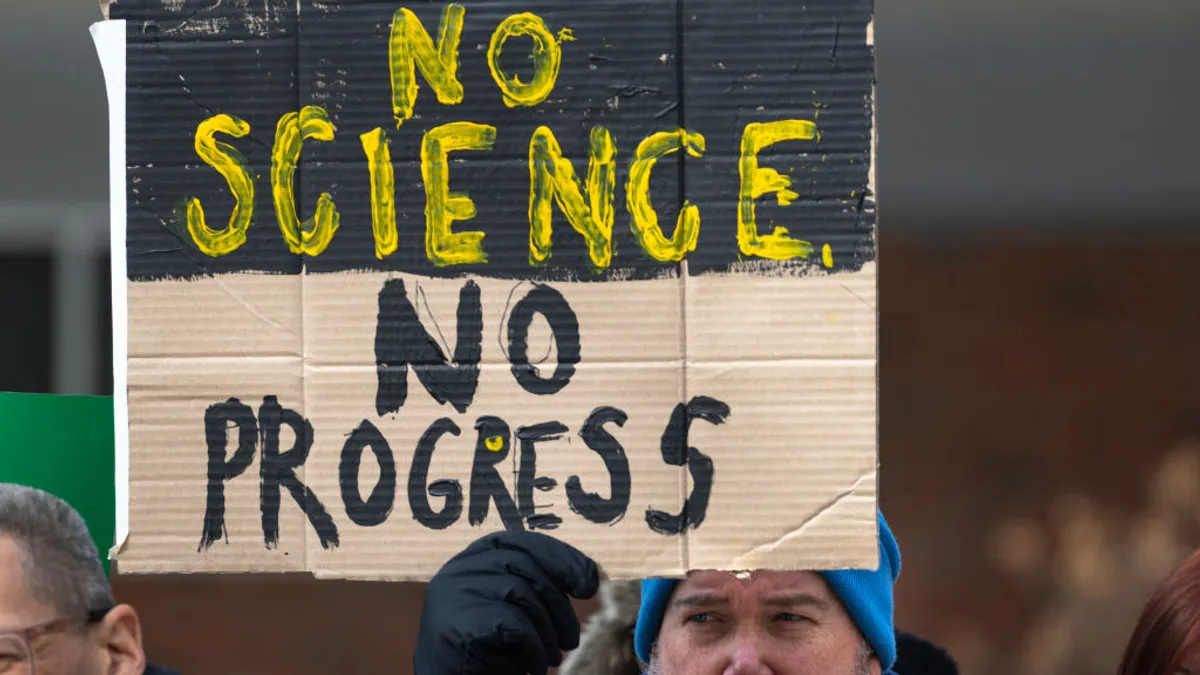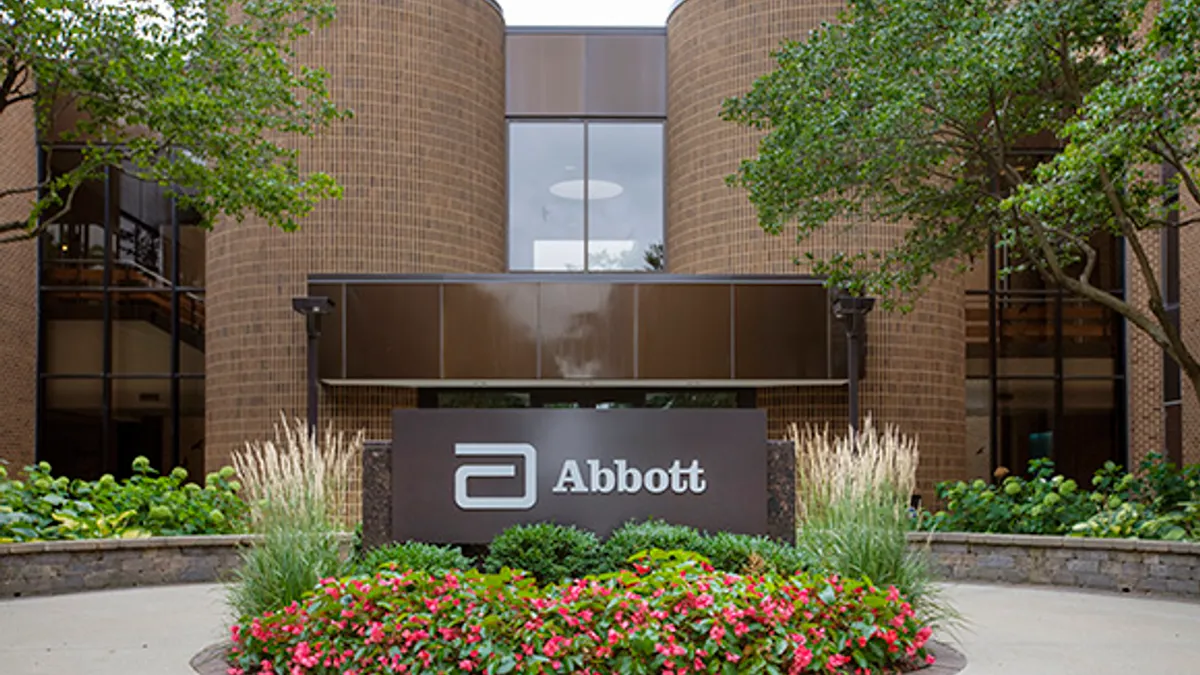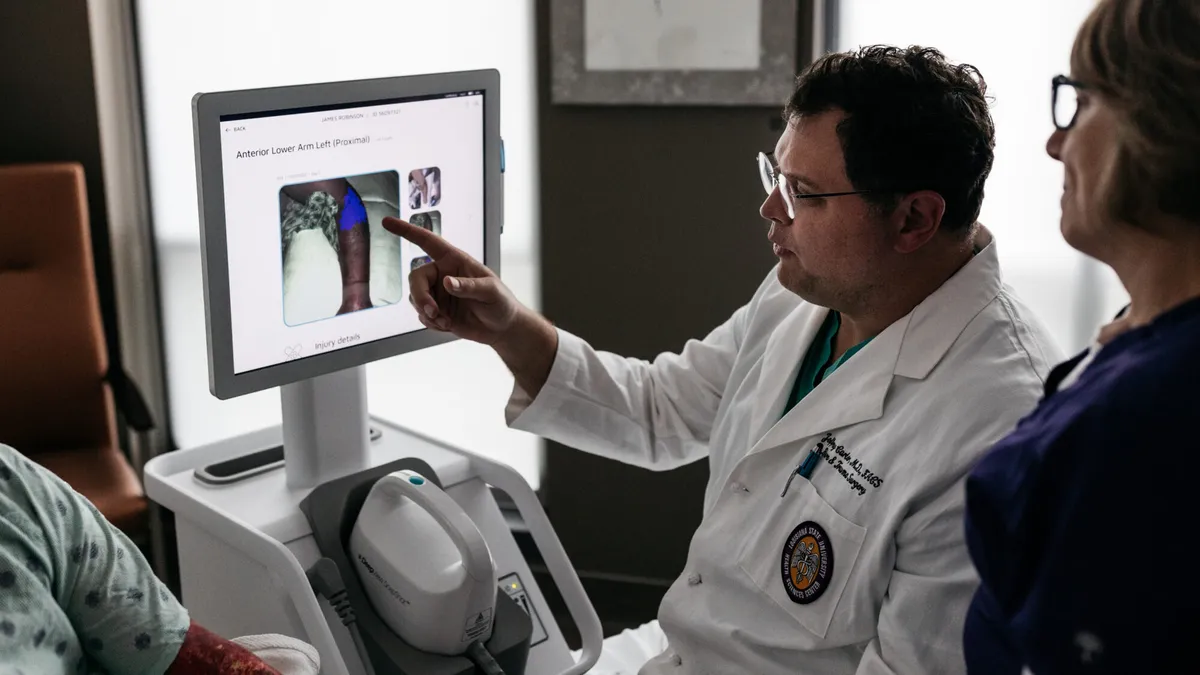A group of independent advisers to the Food and Drug Administration strongly supported use of Pfizer and BioNTech's coronavirus vaccine, clearing the way for the agency to issue an expected emergency approval for the shot.
Meeting Thursday, the committee of vaccine and infectious disease experts reviewed clinical trial results presented by the companies, as well as detailed analysis of the data done by the FDA. While panelists noted questions that still remain, they appeared convinced by the strongly positive findings from Pfizer and BioNTech's trial, which showed the vaccine was 95% effective in preventing COVID-19.
Detailed results from that trial were published Thursday in the New England Journal of Medicine.
In a 17-4 vote, committee members agreed the benefits of vaccination with Pfizer and BioNTech's shot in individuals aged 16 or older outweighed the risks, which study data show are generally mild-to-moderate flu-like symptoms in most people. One member abstained.
Some panelists weren't sure about extending an authorization to cover 16 and 17 year olds, however, noting there isn't as much data to support the vaccine's efficacy in adolescents.
Other experts indicated they were comfortable extrapolating the positive results overall. "We have clear evidence of benefit and all we have on the other side is theoretical risk," said Paul Offit, a vaccine expert at The Children's Hospital of Philadelphia and a committee member.
"I think the safety is pretty well demonstrated — and balance that against 2,500 deaths a day, I'm comfortable," added H. Cody Meissner, a director of pediatric infectious disease at Tufts Medical Center. Meissner, who abstained, took issue with the specific wording regarding use in 16 and 17 year olds.
Further discussion, including any explanation of member votes, was cut short, however, by the meeting's abrupt end soon after the scheduled 5:15 pm conclusion.
Only a few hundred adolescents were enrolled in Pfizer and BioNTech's trial, which largely focused on individuals aged 18 or older. The companies plan to test their vaccine in younger populations, and on Thursday indicated they will begin a study in children aged 5 to 11 years old by April.
Some committee members also had concerns about reports of allergic reactions in two people in Britain who received the vaccine earlier this week. Pfizer and BioNTech said they plan to monitor for such reactions, as well as for other rarer side effects that might emerge during broader use.
Panelists largely accepted the trial results as clear evidence of efficacy. Instead, much of the day's discussion focused on issues still to be answered by trial follow-up. While the evidence is clear on protection from COVID-19, it's still unknown whether vaccination prevents virus transmission or asymptomatic infection, for instance.
Data on the latter point is coming soon, possibly early next year, said Kathrin Jansen, Pfizer's head of vaccine research and development, at the meeting.
The FDA isn't required to follow the committee's advice, although it usually does. In this case, the regulator has viewed the committee's meeting as particularly important in helping build public confidence in an extraordinarily rapid vaccine development process.
With the committee in support, the FDA is expected to quickly move forward with issuing an emergency use authorization, or EUA, a special type of approval granted in public health crises. Peter Marks, the head of the FDA division that reviews vaccines, has said the agency will decide within days to a week of the advisory committee meeting.
Already, regulators in the U.K. and Canada have cleared Pfizer and BioNTech's vaccine and a mass immunization campaign has begun in the former country. The FDA has moved comparatively slower since it received the companies' application on Nov. 20, but is working significantly faster than its usual timeline for drug reviews, which typically take six to 10 months. Unlike other regulators, the FDA pores over results from individual study participants and conducts its own analysis of the raw data.
The agency is under enormous pressure, however, to issue an authorization, especially as COVID-19 cases, hospitalizations and deaths surge to new heights in the U.S.
"An EUA must be granted and it must be granted tonight," said Evan Fein, a participant in an early study of Pfizer and BioNTech's vaccine, who spoke at Thursday's meeting. "As of yesterday, the daily death toll for COVID-19 exceeds the death toll on Sep. 11, 2001. Delays on December 10 will mean more death on January 10."
Should the FDA issue an authorization, Pfizer, working with the U.S., would begin distributing supplies of its shot across the country. But only several million will be ready to go immediately after clearance, and just 50 million will be available for use globally this month. The drugmakers expect to produce as many as 1.3 billion doses next year, but manufacturing will ramp up over time.
Pfizer and BioNTech's vaccine must be shipped and kept at ultra-cold temperatures, a characteristic that has complicated roll-out plans. The companies designed a special container to keep doses frozen, but currently plan to ship only in batches of 975 doses — a challenge for rural clinics and hospitals that might not be able to vaccinate as many people.
Pfizer and BioNTech are the first to reach this point in the U.S. But Moderna, a Cambridge, Massachusetts-based biotech, is not far behind, having submitted an application for emergency approval of its vaccine 10 days after Pfizer and BioNTech.
The advisory committee will meet again to review Moderna's study data next week, on Dec. 17, and an authorization could follow.
Moderna's shot, which works similarly to Pfizer's and BioNTech's, was shown to be equally effective, or 94.5%, in preventing COVID-19.
Editor's note: This story has been updated with further detail from the meeting




















